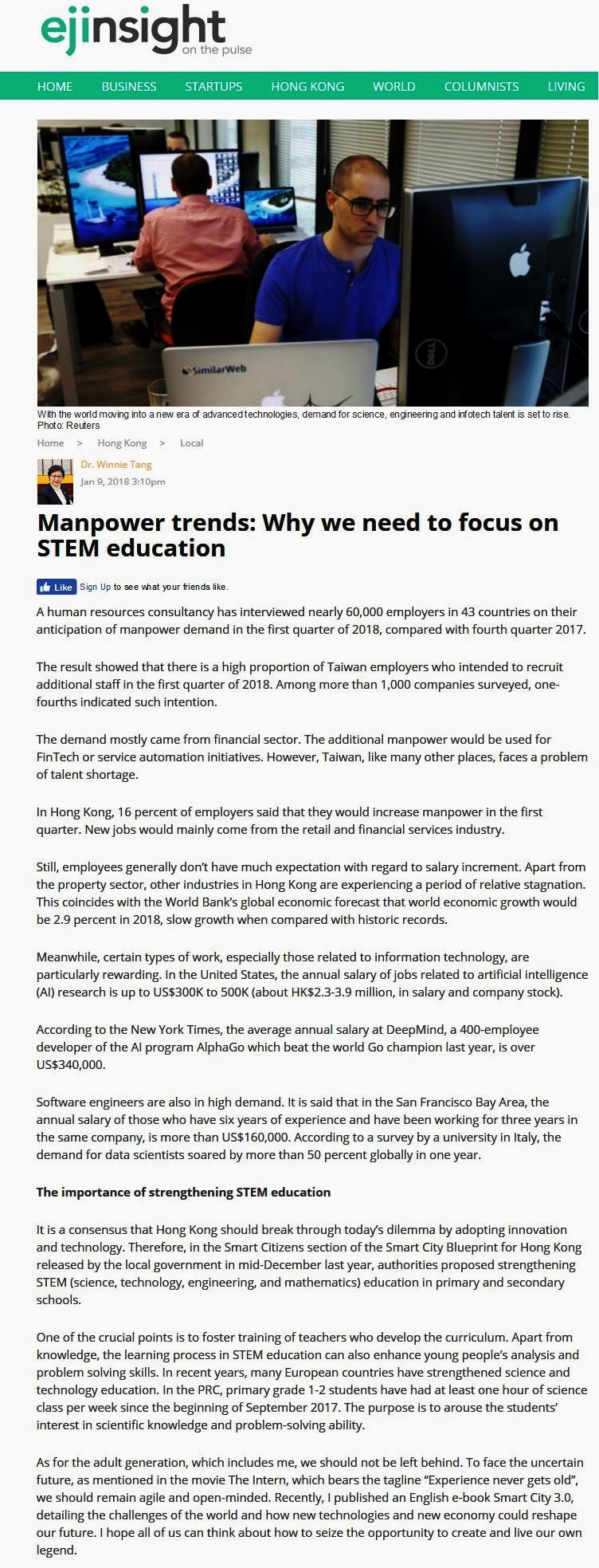網上版請按此

Manpower trends: Why we need to focus on STEM education
A human resources consultancy has interviewed nearly 60,000 employers in 43 countries on their anticipation of manpower demand in the first quarter of 2018, compared with fourth quarter 2017.
The result showed that there is a high proportion of Taiwan employers who intended to recruit additional staff in the first quarter of 2018. Among more than 1,000 companies surveyed, one-fourths indicated such intention.
The demand mostly came from financial sector. The additional manpower would be used for FinTech or service automation initiatives. However, Taiwan, like many other places, faces a problem of talent shortage.
In Hong Kong, 16 percent of employers said that they would increase manpower in the first quarter. New jobs would mainly come from the retail and financial services industry.
Still, employees generally don't have much expectation with regard to salary increment. Apart from the property sector, other industries in Hong Kong are experiencing a period of relative stagnation. This coincides with the World Bank's global economic forecast that world economic growth would be 2.9 percent in 2018, slow growth when compared with historic records.
Meanwhile, certain types of work, especially those related to information technology, are particularly rewarding. In the United States, the annual salary of jobs related to artificial intelligence (AI) research is up to US$300K to 500K (about HK$2.3-3.9 million, in salary and company stock).
According to the New York Times, the average annual salary at DeepMind, a 400-employee developer of the AI program AlphaGo which beat the world Go champion last year, is over US$340,000.
Software engineers are also in high demand. It is said that in the San Francisco Bay Area, the annual salary of those who have six years of experience and have been working for three years in the same company, is more than US$160,000. According to a survey by a university in Italy, the demand for data scientists soared by more than 50 percent globally in one year.
The importance of strengthening STEM education
It is a consensus that Hong Kong should break through today's dilemma by adopting innovation and technology. Therefore, in the Smart Citizens section of the Smart City Blueprint for Hong Kong released by the local government in mid-December last year, authorities proposed strengthening STEM (science, technology, engineering, and mathematics) education in primary and secondary schools.
One of the crucial points is to foster training of teachers who develop the curriculum. Apart from knowledge, the learning process in STEM education can also enhance young people's analysis and problem solving skills. In recent years, many European countries have strengthened science and technology education. In the PRC, primary grade 1-2 students have had at least one hour of science class per week since the beginning of September 2017. The purpose is to arouse the students' interest in scientific knowledge and problem-solving ability.
As for the adult generation, which includes me, we should not be left behind. To face the uncertain future, as mentioned in the movie The Intern, which bears the tagline "Experience never gets old", we should remain agile and open-minded. Recently, I published an English e-book Smart City 3.0, detailing the challenges of the world and how new technologies and new economy could reshape our future. I hope all of us can think about how to seize the opportunity to create and live our own legend.
Dr. Winnie Tang
Honorary Professor, Department of Computer Science, The University of Hong Kong